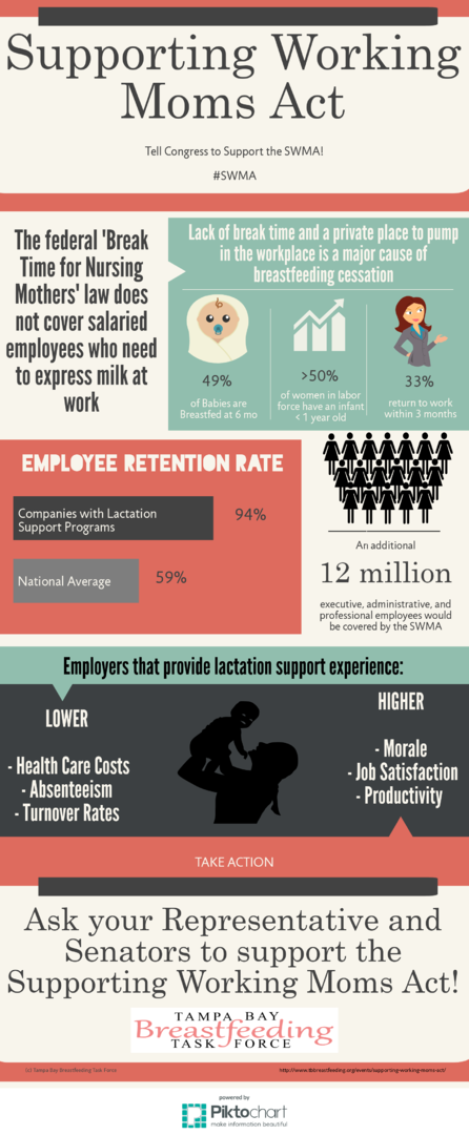Supporting Working Moms Act
Tell Congress to Support the Supporting Working Moms Act (SWMA)!
Federal law currently provides mothers reasonable break times to express milk in a private, non-bathroom location, for one year after the child’s birth. Yet this provision only applies to “nonexempt" (hourly wage-earning) employees. While this provides protection and support for the most vulnerable workers, this distinction in the law was unintentional and is causing confusion about who is covered and how to implement it efficiently and fairly in all worksites.
From the United States Breastfeeding Committee:
Section 7 of the Fair Labor Standards Act requires employers to provide reasonable break time and a private, non-bathroom place for most hourly wage-earning (nonexempt) workers to express breast milk at work. Although it was intended to cover all employees, its placement within existing statute means that it does not cover millions of salaried executive, administrative, and professional employees, including teachers. While it provides protection and support for the most vulnerable workers, this distinction in the law was unintentional, causes confusion, and could be addressed with a simple amendment.
Senator Jeff Merkley (D-OR) and Representative Carolyn B. Maloney (D-NY-12) have introduced the Supporting Working Moms Act (SWMA) to ensure a fair and uniform national policy by extending the existing federal provision to cover salaried employees, including elementary and secondary school teachers. The HHS Office on Women’s Health hosts Supporting Nursing Moms at Work, a comprehensive online resource providing businesses with cost-effective tips and simple solutions for all industries. Twenty-eight U.S. states, Puerto Rico, and the District of Columbia also have state legislation to support breastfeeding in the workplace.
The Surgeon General's Call to Action to Support Breastfeeding; the Institute of Medicine report, Accelerating Progress in Obesity Prevention; and the National Prevention Strategy each call on employers to establish and maintain lactation support programs for their employees. Yet in spite of this tremendous recognition and recent expansion of support for breastfeeding moms in the workplace, only some moms are guaranteed this right.
- Submit a story about your personal experience with the federal "Break Time for Nursing Mothers" law
- Use our online tool to write to your Representative and Senators
- Share the campaign on Facebook or Twitter to tell your network to take action (coming soon)
- Tweet at your elected officials to ask them to support the bill
- National and state organizations are invited to sign on to a letter in support of the SWMA
What Can YOU
do to help? Here are some Easy Action Tools from the TB Task Force:
- Share the Infographic (below) on Facebook, Twitter, Pinterest, or other social media
- Share the Video (below) on social media!
- Visit our Twitter page and Retweet what we have sent to Congress: https://twitter.com/TbBreastfeeding
- Use the USBC's Call to Action tools and information.
Supporting Working Moms Act Video
Social Media Messages:
-
Breastfeeding Employees need: A place to express milk privately, flexible breaks and work options, support! #tellcongresstoSWMA #SWMA
-
Breastfeeding is good for babies, it’s good for moms, and it’s good for business. #TellCongressToSWMA #SWMA
-
Lactation support at work = Positive long term health impacts without sacrificing family economic stability #TellCongressToSWMA #SWMA
-
Extend the law to executive, administrative, professional employees reasonable break time for lactation #TellCongressToSWMA #SWMA
-
Employers that provide lactation support have improved employee job satisfaction & morale #tellcongresstoSWMA #SWMA
-
Suboptimal breastfeeding rates incur a total of $17.4 billion to society annually #tellcongresstoSWMA
-
More then 50% of women with infants are in the labor force #tellcongresstoSWMA
-
Employers that provide lactation support have less employee absenteeism, employee turn over, lower healthcare costs #tellcongresstoSWMA #SWMA
-
Employer lactation support provides cost savings of $3 per $1 invested in nursing support #tellcongresstoSWMA #SWMA
-
Employers that provide lactation support have an increase in employee productivity & improved public image #tellcongresstoSWMA #SWMA
-
Women employed full-time are less likely to continue breastfeeding once they return to work without lactation support #tellcongresstoSWMA #SWMA
-
Women feel more confident to continue to breastfeeding when there is a supportive worksite environment #tellcongresstoSWMA #SWMA
-
Lack of lactation accommodations contributes to lower breastfeeding duration #tellcongresstoSWMA #SWMA
-
Tell Congress to Support ALL Breastfeeding & Working Moms! Send a message to your Representative and Senators #SWMA



